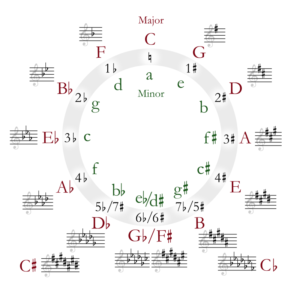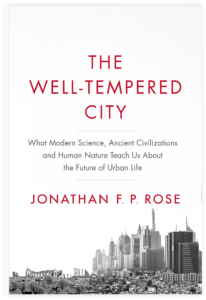The Well-Tempered City – A Review
Most books written by urbanists have limited readership for two reasons: one, they lack flow and a certain literary quality; and two, they are really intended for other urbanist geeks and/or are reference books for those in the profession. Walkable City and Happy City break this mold somewhat by being both highly readable and good urban reference books. The Well-Tempered City, by Jonathan F. P. Rose, goes deeper and cuts across urban history and a wide range of topics to consider how we may live in cities in the future. It is also pretty readable if you are smart enough to hang with it (I question my ability on the latter).
Rose had me at the very beginning by relating cities to music, two topics I care deeply about. He takes the title of his book from Johann Sebastian Bach’s “The Well-Tempered Clavier,” in which Bach demonstrates that proper tuning, or “tempering,” allows musicians and composers to move between keys without going out of tune. Aspiring musicians must know the Circle of Fifths. Tempering revolutionized music, and, Rose argues, is required to reshape how we design our cities to achieve better social and ecological balance. I told you this was deep.
The book lays out five aspects of a well-tempered city: coherence, circularity, resilience, community, and, perhaps most importantly, compassion. His first section, on coherence, takes us through some milestones in city building, from the fertile crescent to sprawl. Not to mix metaphors, but it is dense, and requires a second read.
The Well-Tempered City moves through time and space to look at countless factors impacting how we live in today’s cities, including water, disease, and public health, or the circular economy of systems (circularity). He cites Hyde Park as the first park open to the public (in 1637) and today’s green, affordable and healthy buildings. He only breaks the surface on how big data influences “smart cities” (we are quickly finding out, however).
Rose travels far and wide to find examples of coherence, circularity, resilience and community to knit this book together, including Batman and Syria, the UN and the Ubaid Period. To say community is important is an understatement, and well-tempered neighborhoods matter more than ever. From the Gini coefficient to equal access to education to disproportionate spending on health care and social services (looking at you, United States), he argues that we are all in this together. It is a VUCA world (Volatile, Uncertain, Complex, and Ambiguous), and we must temper how we allocate dollars and resources in order for cities to be more adaptable and resilient. Whew! There is a lot to digest here, but The Well-Tempered City is worth reading and using for future reference, and not just for urbanists. Start by buying a copy for your city council member.
To go back to the music analogy, I recall the movie “Koyaanisqatsi,” a 1980s movie whose title in Hopi means “life out of balance” (the sequel, “Powaqqatsi,” loosely translates to “we’re totally f*#&ed”). This is interesting because Philip Glass, the composer of the musical scores for both movies, is mentioned in the book. The Koyaanisqatsi score is brilliantly dystopian when accompanying by jarring images of the wrath humans have brought on the earth. Rose calls for nothing short of a new age of enlightenment, something events in 2015 and 2016 have so far not indicated is occurring.
One might use Bach as a soundtrack for building cities. After all, many entertainment districts blast Bach and other classical music over loudspeakers to disperse unruly, drunken crowds at bar time. However, I’d argue that Philip Glass and even Green Day also compose well-tempered music. Where does that leave us with Rose? It makes perfect sense to build more resilient cities with stronger community bonds. In a post-Brexit, Trump-ian world, compassion is key, but this is all a tall order, as globalism isn’t going away. Rose spends by far the fewest words on his section about compassion, and it is fascinating that the final word of the book is “peace.” I guess love is all you need.
1 Comment »
RSS feed for comments on this post. TrackBack URI
Leave a comment
Line and paragraph breaks automatic, e-mail address never displayed, HTML allowed: <a href="" title=""> <abbr title=""> <acronym title=""> <b> <blockquote cite=""> <cite> <code> <del datetime=""> <em> <i> <q cite=""> <s> <strike> <strong>



[…] Friday, October 7th: Joe Urban […]
Pingback by Jonathan F. P. Rose, author of The Well-Tempered City, on tour September 2016 | TLC Book Tours — October 14, 2016 @ 8:11 pm